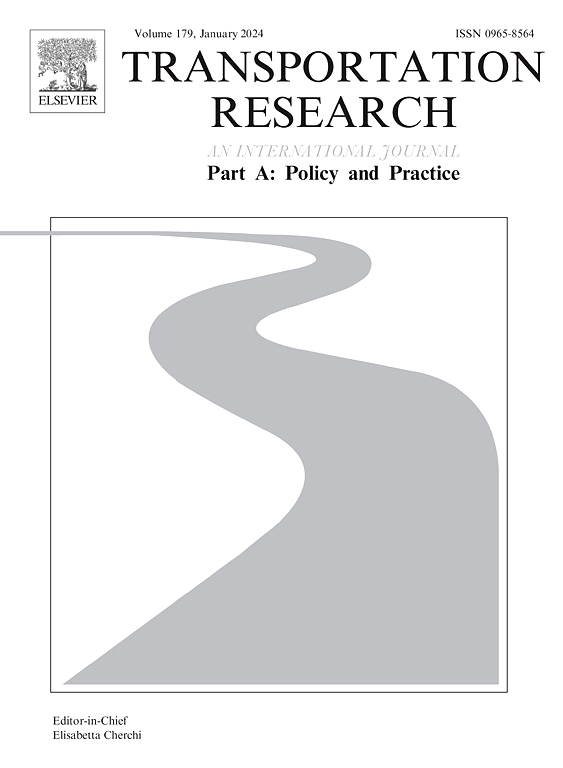针对级联故障的全球集装箱运输网络多目标弹性优化
IF 6.8
1区 工程技术
Q1 ECONOMICS
Transportation Research Part A-Policy and Practice
Pub Date : 2025-08-29
DOI:10.1016/j.tra.2025.104659
引用次数: 0
摘要
港口的破坏性事件(如流行病、自然灾害和区域冲突)不断挑战货流的稳定性,导致连锁故障,严重破坏全球航运网络的复原力。为了应对这些挑战,本研究提出了一个新的多目标逐步优化(MSO)框架,可以帮助决策者保持对级联故障的弹性。具体而言,本研究首先制定了多个目标,旨在通过减少运输时间、减轻港口过载和保持网络结构完整性来最大限度地减少对海事利益相关者的不利影响。在此基础上,提出了一种逐步级联缓解(SCM)模型,以探索减轻级联效应的理想负荷重分配策略。在该模型中,首先确定所有可行的目标端口,然后采用迭代算法确定负载重新分配到每个目标的平衡体积。然后设计了一种进化过程,以确保不同解的更新并降低计算复杂度。通过模拟整个级联过程,最终评估了航运网络弹性的多维降低。以全球集装箱航运网络(GCSN)为例,进行了综合实验,并对主要国际港口进行了有针对性的分析,以验证MSO框架相对于四种基准方法的有效性和优越性。灵敏度分析结果进一步表明,在整个网络中保持适当的冗余,并结合所提出的最优重新分配策略,可以有效地减轻级联故障对系统弹性的不利影响。因此,本研究为利益相关者提供了适应性强的应急响应协议,以缓解关键港口的过度拥堵,确保货物的及时可靠流动,从而主动保护全球供应链的整体稳健性和弹性。本文章由计算机程序翻译,如有差异,请以英文原文为准。
Multi-objective resilience-oriented optimisation for the global container shipping network against cascading failures
Disruptive events at ports (e.g., epidemics, natural hazards and regional conflicts) continuously challenge the stability of cargo flows, leading to cascading failures that significantly undermine the resilience of global shipping networks. To address these challenges, this study proposes a new Multi-objective Stepwise Optimisation (MSO) framework that can aid decision-makers in maintaining resilience against cascading failures. Specifically, this study first formulates multiple objectives aimed at minimising adverse impacts on maritime stakeholders by reducing transit time, alleviating port overload, and preserving the network’s structural completeness. Then, to explore ideal load redistribution strategies mitigating the cascading effects, a Stepwise Cascading Mitigation (SCM) model is newly developed. In this model, all feasible target ports are identified, followed by an iterative algorithm applied to determine the equilibrium volumes of load redistributed to each target. An evolutionary procedure is then designed to ensure renewal of diverse solutions and reduce computational complexity. By simulating the entire cascading process, multi-dimensional reductions in shipping network resilience are eventually assessed. Taking the Global Container Shipping Network (GCSN) as a case study, comprehensive experiments, alongside targeted analyses of major international ports, are conducted to validate the effectiveness and superiority of the MSO framework over four benchmarking methods. Sensitivity analysis results further reveal that maintaining appropriate redundancy across the network, combined with the proposed optimal redistribution strategies, can effectively mitigate the adverse impacts of cascading failures on system resilience. Therefore, this study provides stakeholders with adaptable emergency response protocols to alleviate excessive congestion at critical ports, ensuring the timely and reliable movement of goods, thereby proactively protecting the overall robustness and resilience of global supply chains.
求助全文
通过发布文献求助,成功后即可免费获取论文全文。
去求助
来源期刊
CiteScore
13.20
自引率
7.80%
发文量
257
审稿时长
9.8 months
期刊介绍:
Transportation Research: Part A contains papers of general interest in all passenger and freight transportation modes: policy analysis, formulation and evaluation; planning; interaction with the political, socioeconomic and physical environment; design, management and evaluation of transportation systems. Topics are approached from any discipline or perspective: economics, engineering, sociology, psychology, etc. Case studies, survey and expository papers are included, as are articles which contribute to unification of the field, or to an understanding of the comparative aspects of different systems. Papers which assess the scope for technological innovation within a social or political framework are also published. The journal is international, and places equal emphasis on the problems of industrialized and non-industrialized regions.
Part A''s aims and scope are complementary to Transportation Research Part B: Methodological, Part C: Emerging Technologies and Part D: Transport and Environment. Part E: Logistics and Transportation Review. Part F: Traffic Psychology and Behaviour. The complete set forms the most cohesive and comprehensive reference of current research in transportation science.

 求助内容:
求助内容: 应助结果提醒方式:
应助结果提醒方式:


